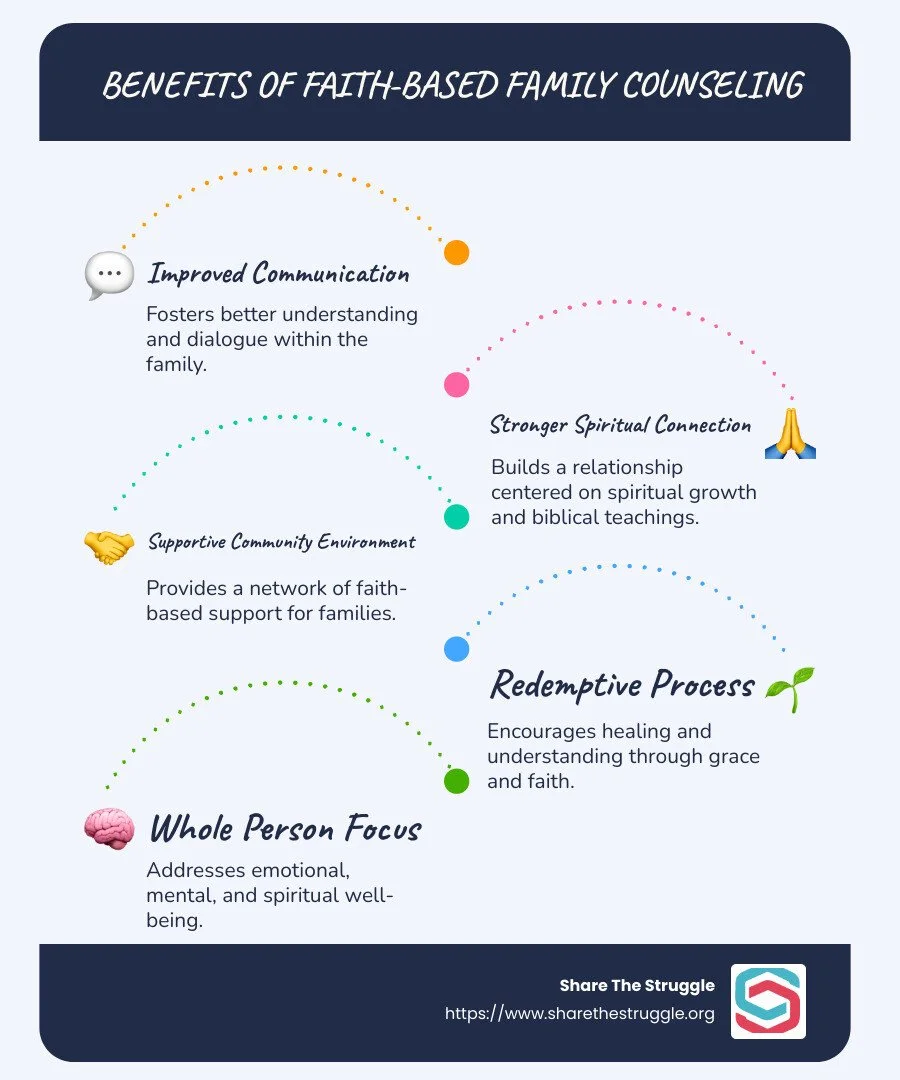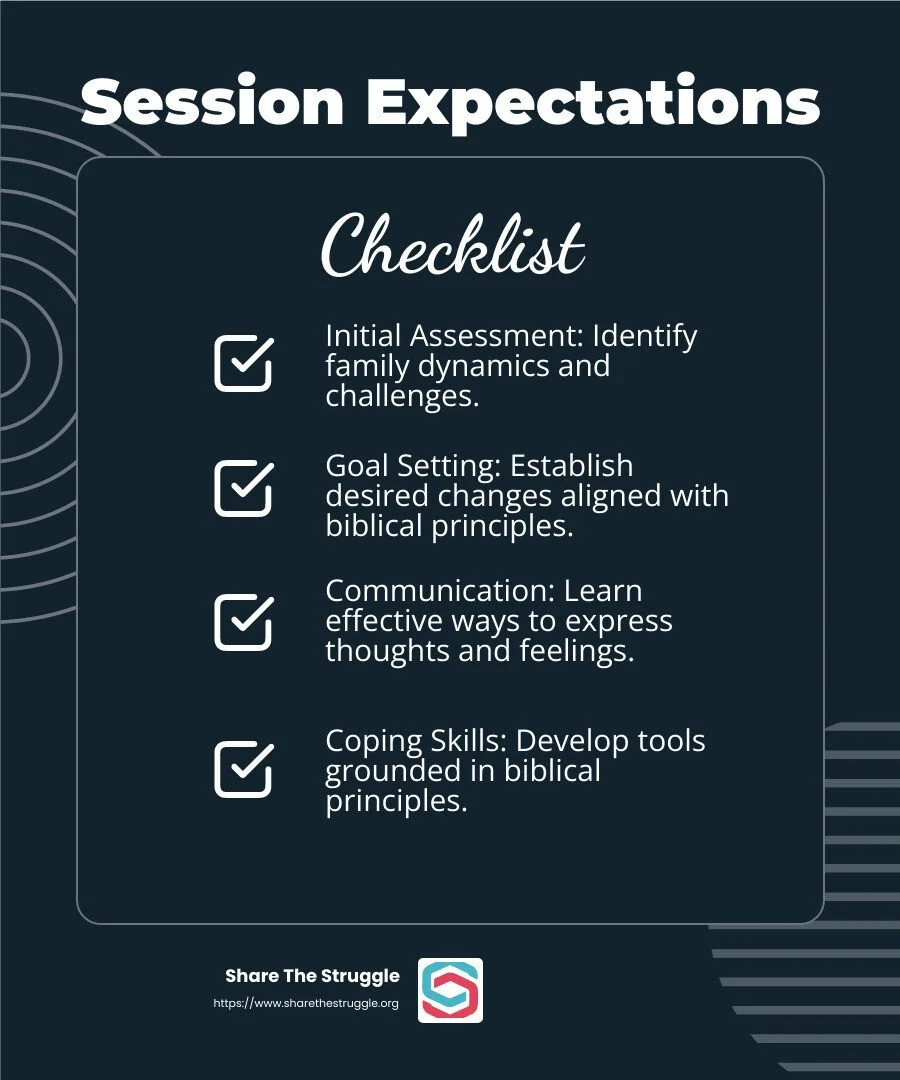Faith-Based Family Counseling: Principles and Practices
Biblical family counseling is a unique approach to addressing family dynamics through faith-based principles, drawing guidance and wisdom directly from the Bible. This form of counseling is centered on the belief that biblical teachings can provide profound insights into family roles, communication, and resolving conflicts. Key aspects include:
Biblical Principles: Applying scripture to daily life and family interactions.
Family Dynamics: Understanding and improving interpersonal relationships.
Faith-Based Approach: Integrating spiritual beliefs into the healing process.
Why choose Biblical family counseling? It not only focuses on emotional well-being but also fosters spiritual growth by aligning family goals with biblical teachings.
As Richard Mattingley, my background in mental health and learning development, coupled with a passion for guiding individuals and families, equips me to explore the benefits and practices of Biblical family counseling deeply. My aim is to simplify these concepts and highlight the role that coaching, accessible on the Share The Struggle platform, can play in your journey.
Understanding Biblical Family Counseling
Biblical family counseling is deeply rooted in scripture, offering guidance for families through a faith-based lens. This approach integrates Christian counseling techniques with biblical teachings to address the spiritual needs of the family unit, providing a holistic framework for healing and growth.
Key Biblical Principles
The foundation of Biblical family counseling is scripture. Key verses such as Colossians 3:18-21 and Ephesians 6:4 offer direct guidance on family relationships. These passages emphasize respect, love, and proper upbringing within the family.
Colossians 3:18-21: This scripture highlights the importance of mutual respect and love within family roles. It instructs children to obey their parents and parents to encourage rather than discourage their children.
Ephesians 6:4: This verse advises fathers not to provoke their children, but to bring them up with discipline and instruction from the Lord.
These principles are vital for maintaining harmony and understanding within the family unit. They serve as a guide for families to align their daily interactions with biblical teachings, fostering a nurturing environment.
Differences Between Secular and Christian Counseling
While both secular and Christian counseling aim to improve family dynamics, they differ significantly in their approach. Christian counseling places God as the ultimate authority, using His Word as the primary foundation for addressing issues.
God as Authority: In Christian counseling, the Bible is the main source of wisdom and authority. Counselors use scripture to guide families toward solutions that align with their faith.
Heart Change: Unlike secular counseling, which often focuses solely on behavior modification, Christian counseling emphasizes a change of heart. This is based on the belief that true change comes from aligning one's heart with God's will.
Spiritual Dimension: Christian counseling incorporates a spiritual dimension, addressing not only emotional and mental well-being but also spiritual growth. This holistic approach helps families connect more deeply with their faith.
By addressing these spiritual needs, Biblical family counseling offers a comprehensive framework for healing and growth. It encourages families to overcome obstacles together, using biblical truths as their guide.
For those seeking support, coaching available on the Share The Struggle platform can be an invaluable resource. Coaches skilled in Biblical family counseling can help families integrate these principles into their lives, fostering both spiritual and emotional well-being. By connecting with a coach through our site, families can find the guidance they need to navigate their challenges with faith and resilience.
Benefits of Biblical Family Counseling
Addressing the Whole Person
Biblical family counseling is unique because it focuses on the whole person—body, mind, and spirit. This approach not only addresses emotional and mental well-being but also accepts spiritual needs. Research shows that integrating spiritual dimensions into therapy can lead to increased gratitude, optimism, and overall mental well-being. Families engaging in this type of counseling often experience a deeper sense of spiritual fulfillment and connection with one another.
Redemptive Process
The journey of Biblical family counseling is a grace-filled, redemptive process. It encourages families to grow closer to each other and to God, who is seen as the ultimate healer. This process is not just about resolving conflicts but about changing relationships through grace and forgiveness. By aligning with biblical teachings, families can find healing and restoration, creating a more harmonious home environment.
Overcoming Obstacles Together
One of the greatest strengths of Biblical family counseling is its focus on overcoming obstacles as a united family. Counselors guide families to view their challenges through the lens of biblical truths, which can provide a supportive and nurturing environment. This approach helps family members work together, fostering unity and a shared sense of purpose. By applying Bible-based principles, families learn how to support each other and tackle issues collaboratively.
For families seeking to accept these benefits, connecting with a coach through Share The Struggle can be an excellent step. Coaches skilled in biblical counseling are ready to help families integrate these principles, promoting spiritual growth and emotional health.
Common Issues Addressed in Biblical Family Counseling
Family Roles and Goals
In Biblical family counseling, understanding family roles and setting clear goals are crucial. When parents aren't aligned, it can lead to confusion and conflict. Counseling helps in defining roles based on biblical principles, ensuring each family member knows their responsibilities. This includes setting boundaries and establishing priorities that reflect Christian values.
A counselor may ask, "What are your family's goals, and how do they align with biblical teachings?" This question encourages families to reflect on their aspirations and how they can achieve them together.
Parent-Child Conflicts
Parent-child conflicts are common but can be particularly challenging. These conflicts often stem from communication problems, differing discipline styles, and sibling rivalry. Biblical family counseling offers strategies to address these issues, such as improving communication and understanding different perspectives.
For example, counselors might use Ephesians 6:4, which advises fathers not to exasperate their children. Instead, parents are encouraged to nurture their children in the discipline and instruction of the Lord. This approach fosters respect and understanding, reducing conflict.
Faith and Spiritual Challenges
A crisis of faith can deeply affect family dynamics. Biblical family counseling addresses these challenges by helping families reconnect with God and strengthen their spiritual maturity. Counselors guide families through periods of doubt, using scripture to rebuild their faith.
Families often struggle with maintaining their spiritual connection. Counselors help by encouraging practices like prayer and Bible study, which can fortify faith and bring family members closer to God.
For those facing these common issues, support is available. At Share The Struggle, you can connect with a coach who specializes in biblical counseling. They can help guide your family through these challenges, fostering a healthier, more spiritually connected home.
What to Expect During a Session
Initial Assessment
In Biblical family counseling, the first session focuses on understanding the family's unique dynamics and challenges. The counselor gathers everyone together in a safe, Christ-centered environment, encouraging openness and honesty without judgment.
The initial assessment involves identifying the key issues the family faces. The counselor asks questions about each family member's perspective on the problems and explores the family's spiritual beliefs, such as how often the family prays together or engages in other spiritual practices. Understanding these spiritual dimensions is crucial, as they play a significant role in the family's overall well-being.
Setting Goals
Once the problems are identified, the next step is setting goals. This involves examining the family's structure, strengths, and weaknesses. The counselor guides the family in establishing desired changes and aligning these with biblical principles.
For instance, if communication is a major issue, the goal might be to improve how family members express themselves and listen to one another. The counselor might use biblical teachings to inspire these changes, fostering a more harmonious family environment.
Therapeutic Techniques
During the sessions, various therapeutic techniques are employed to help the family achieve their goals. Effective communication is often a primary focus. Families learn how to express their thoughts and feelings constructively, promoting understanding and unity.
Coping skills are also taught, providing family members with tools to handle stress and conflict. These skills are grounded in biblical principles, offering a spiritual foundation for dealing with life's challenges.
For example, a counselor might use scripture to illustrate the importance of patience and forgiveness, encouraging family members to practice these virtues in their interactions.
Throughout the process, the counselor remains a neutral guide, helping the family apply biblical truths to their lives. This approach not only addresses the immediate issues but also strengthens the family's spiritual connection.
For those seeking support, Share The Struggle offers coaches who specialize in biblical counseling. They can help your family navigate these therapeutic techniques, fostering a healthier, more spiritually connected home. To get connected with a coach, visit Share The Struggle and explore the resources available to support your family's journey.
Frequently Asked Questions about Biblical Family Counseling
What is the biblical advice on family relationships?
In Biblical family counseling, scripture serves as the ultimate guide. The Bible offers clear instructions on family dynamics. For example, Colossians 3:18-21 emphasizes love and respect within family roles, while Ephesians 6:4 advises fathers not to provoke their children but to nurture them in the Lord's discipline.
John 17:17 reminds us, "Sanctify them in the truth; your word is truth." This highlights the Bible as the authority in guiding family relationships. Romans 15:14 also underscores the importance of mutual encouragement and teaching within the family.
How does biblical counseling differ from secular counseling?
The main distinction lies in the foundation. Biblical counseling uses God's Word as the ultimate authority. It focuses on heart change, not just behavior modification. Jeremiah 17:9 tells us the heart is deceitful, and true change comes from addressing the heart's condition.
Secular counseling often relies on psychological theories without a spiritual component. In contrast, biblical counseling integrates faith, offering a spiritual dimension that aligns with Christian beliefs.
What are the stages of biblical counseling?
Biblical family counseling follows a structured process:
Client Relationship: Building a trusting relationship is crucial. The counselor provides a safe space for families to share openly.
Assessing Problems: The counselor identifies the family's issues, considering both spiritual and emotional aspects.
Setting Goals: Clear goals are established, based on biblical principles. These goals guide the counseling sessions.
Interventions: The counselor uses biblical teachings and therapeutic techniques to address the family's challenges. This might include improving communication or resolving conflicts.
Follow-Up: Regular check-ins ensure the family continues to grow and apply what they've learned.
At Share The Struggle, we believe that coaching is a vital form of support for families seeking to apply these principles. Our coaches are equipped to guide families through the process of biblical counseling, fostering spiritual growth and unity. To connect with a coach and explore how biblical counseling can benefit your family, visit our website.
Conclusion
At Share The Struggle, we believe that everyone can benefit from Biblical family counseling. It provides a holistic approach to healing, addressing not just the mind and emotions but also the spirit. By integrating biblical principles, families can experience deeper connections and lasting change.
Coaching Support
Our unique approach, the Captive Thoughts coaching model, helps individuals and families take control of their thoughts and emotions. By aligning these with Christ's teachings, we aim to foster spiritual growth and emotional well-being. Our coaches are trained to guide you through life's challenges, offering support rooted in faith.
Connecting with a Coach
If you're ready to explore how Biblical family counseling can benefit your family, we invite you to connect with one of our experienced coaches. They are equipped to help you steer family dynamics, improve communication, and strengthen your spiritual foundation.
Visit our coaching service page to learn more and take the first step towards a healthier, more united family. Our team is here to support you on this journey, helping you apply biblical principles to overcome obstacles and build a stronger family unit.
With God's guidance and the support of our dedicated coaches, you can achieve the changes you desire and live a fulfilling life in alignment with His will.




